The members of the fifth cohort of the Rising Leaders of Color (RLC) program have, like all of us, seen their 2020 plans upended. RLC is a yearlong program of Theatre Communications Group (TCG) designed to develop talented early-career BIPOC (Black, Indigenous, and people of color) theatre leaders. Typically, the cohort meets for workshops before the annual TCG conference in early June. As a member of the 2018 cohort, which was partly based in St. Louis, I remember this time as being full of all-day workshops, dinners, and bonding with my cohort.
The coronavirus pandemic has meant that the fifth cohort has still not met in person. But they have not let that stop them from forming bonds. In addition to attending TCG’s virtual National Convening in June and participating in virtual workshops and professional development sessions, the eight-member cohort organizes its own once-a-week virtual meetings. “My cohort members are extraordinary—I’m learning so much from them,” says Peter Kim, an actor, producer, director, and teacher.
Kim recounts how fellow RLC member Victor Vazquez, a casting director, shared practical ideas about getting cast. As a result, Kim, who is involved with the National Asian American Theatre Company (NAATCO), held the first NAATCO Drop In, a chance for members of NAATCO to meet other Asian American theatre artists.
“People called in from all over the world,” Kim says. “So there are tangible things that I am learning from my cohort that I can apply in my work.”
“I think the building of trust takes a little bit longer because we’re not in person,” concedes Emilya Cachapero, director of artistic and international programs, who oversees the RLC, which is supported by the Howard Gilman Foundation, The Hearst Foundations, and Walt Disney Imagineering. She and her team have reimagined the program, connecting RLC members one-on-one with theatremakers they may have missed networking with at the conference, and offering several new workshops, including one on thriving and resiliency in the face of racial trauma. “It’s time to rethink all the pieces,” Cachapero adds.
And that is, in part, what this cohort has been doing during the shutdown: rethinking, imagining, demanding change, and finding ways to adapt, all while building camaraderie with each other.
Tahnia Belle: Experiences of Celebration
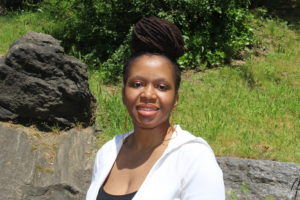
Since the shutdown, Tahnia Belle, director of operations and special projects for Urban Bush Women (UBW), has been busy as ever. At UBW, almost everyone switched to remote work and devised new ways to engage with the artistic community and supporters.
Belle recently finished working on the UBW’s 20th annual Summer Leadership Institute (SLI), which was held virtually for the first time as a convening for alumni to discuss the impact that the SLI has had on them.
Belle is one of those alumni — in 2007, she attended the 10-day intensive gathering of community-based artists and activists — and its impact on her was profound. “I learned to acknowledge and lay down my assumptions. And [SLI] provided a framework and analysis for the historical and human impact of race in the U.S.,” she says.
Several years later, Belle joined the UBW staff. “There are so many special aspects of UBW: the depth of values, the boundary-pushing, beautifully uncomfortable stage work, the SLI,” Belle says. “UBW brings the most wonderful, purpose-driven folks to its community.”
In addition to working in the arts, Belle, along with her husband, Troy, founded SunnEvents & Consulting, a lifestyle and socially conscious events company. The company specializes in events that draw on the Black immigrant community experience, with an emphasis on Caribbean culture. (Belle is Haitian American.)
“While COVID-19 has put a pause on in-person experiences, it has given us some time to reimagine SunnEvents and Consulting and shift our focus more on the consulting arm of our company and to begin planning for what we can authentically offer in virtual space and in social-distanced models,” Belle says.
During this time she is also enjoying getting to know her RLC cohort. “It is important for me to have the opportunity to connect with, share with, and learn from like-minded individuals who are all discovering what leadership means as a person of color in the performing arts field,” she says.
Kareem Fahmy: Straddling Borders
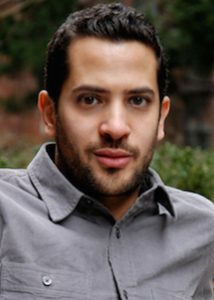
Since the shutdown, playwright and director Kareem Fahmy has directed readings and done some work for Rattlestick Playwrights Theatre’s Pride Plays festival. But he’s also been focusing on his playwriting.
“In 2012, I came back to writing,” he says. “I realized that there are just a lot of stories about Middle Eastern life and experience and Muslim life and experience that haven’t been told yet. And I really wanted to contribute to building up the canon of Middle Eastern American work.”
One of his latest projects is A Distinct Society, set at Haskell Free Library and Opera House, which straddles the border between Canada and the United States. Fahmy learned that Muslim families separated by the U.S. “Muslim ban” used the library as a neutral place to meet. The library also happens to be close to where Fahmy grew up in Quebec.
“That’s me in a nutshell,” Fahmy says. “It is a Canadian story, an American story, and a Middle Eastern story.” He has worked on the play with several theatres, including Oregon Contemporary Theater, New York Stage & Film, and the Lark.
Fahmy is also adapting The Yacoubian Building, an epic novel that centers on Egyptians living in the titular building, for the stage. It was already adapted into one of the highest-grossing Arabic films of all time. “It was this amazing moment somewhere between luck and shock when I inquired to see if I might be able to do an adaptation to a theatre piece, and the writer said yes,” Fahmy says.
The play is for 13 Middle Eastern actors. “For me it’s my time to show that you can actually tell a story about Middle Eastern life and Middle Eastern culture and completely do it without an outside Western character,” he says. “It is truly an authentically Egyptian story.” It’s also a lot to adapt. “It’s one of the most ambitious things I’ve ever had the privilege of working on,” he says with a laugh.
Fahmy started thinking about joining the Rising Leaders of Color program after being selected as the Phil Killian Directing Fellow at Oregon Shakespeare Festival in 2019. “I really learned what it’s like to be an artistic director,” Fahmy said, from his experience shadowing AD Bill Rauch. “I thought the RLC would be a great way of taking some of that learning forward.”
And it couldn’t have come at a better time for Fahmy, “It feels like there’s a different urgency now,” Fahmy says. “A more specific need for a cohort of leaders of color to step forward and try to create a new conversation for what our industry needs to do to represent communities of color.”
Lanxing Fu: Hybrid Space-Maker
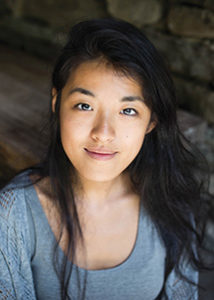
For Lanxing Fu, an eco-theatre artist, joining the RLC felt particularly urgent. “I was interested in meeting with and building a cohort of like-minded leaders,” Fu says. “Especially now in these times of great upheaval and change—we are going through a portal that I hope will allow us to reshape the extractive, destructive systems we live and create within, and build regenerative systems with grace. I wanted to find community and collaboration with others in that work.”
As co-director of Superhero Clubhouse, an eco-theatre community committed to environmental justice, a workshop facilitator, and teaching artist, Fu has been working to shift perceptions around environmental justice for years. She is the co-creator of several works, including Mammelephant, which was shown at the New Ohio and HERE Arts Center as a work-in-progress. The piece is about an actual ongoing experiment to create Pleistocene Park in an effort to stop the thawing of arctic permafrost. The park will recreate an Ice Age eco-system by bringing woolly mammoths back to an area in Siberia. Geneticists at Harvard are splicing the DNA of wooly mammoths into live Asian elephants to create the mammoth-elephant hybrid.
“Mammoths and elephants live in matriarchal herds, learning everything from their mothers,” Fu says. “The first mammelephant will be a transplant, far from any family, the sole member of her species. Our play follows her as she tries to create a future in uncharted territory.”
Now all of us are in uncharted territory, and Fu hopes that for theatre it offers the chance for great change. “Stories have always been the way that humans make meaning of the world, and the form they take should serve current needs,” Fu says. “What we need now is for us as artists to be expansive. We must engage communities as diverse as the world is in our art and our art-making. We need to be the translators, the space-makers, the story-spinners, furiously sketching out maps as we hurtle forward into unknown, uncertain time.”
Miranda Haymon: Multi-Voiced Expression
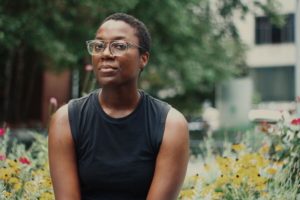
At 26, Miranda Haymon was hired by Roundabout Underground to direct Dave Harris’s Exception to the Rule, which would make them the youngest director in the New York City company’s history. The show was supposed to premiere in Spring 2020 but has been delayed till 2021. Though postponed, this still represents an exciting breakthrough for the award-winning director, who is also a writer, generative artist, performer, and drag king.
With that many roles in their life, Haymon has used the shutdown to slow down. “During quarantine, I’ve been investigating my process as an artist,” Haymon says. “Since much of my process was in response to the climate of the times (i.e. long days, quick-turn arounds) I’m relishing this time to mull and give space to my ideas and musings. It’s really refreshing to set up new boundaries for myself and my art making.”
Artistically, Haymon is interested in inclusive, multi-voiced theatre that sparks dialogue. Harris’s Exception to the Rule is about six Black students stuck in detention at one of the worst schools in New York. And Haymon’s own In the Penal Colony, which they staged at Next Door at NYTW and the Tank, is based on a short story by Franz Kafka (they majored in German studies and theatre at Wesleyan), and it questions the ways that Black men are portrayed and ultimately consumed in the media.
Since theatres have closed, Haymon is focusing on getting the message out in other ways. In a recent article for Howlround, “How Liberal Arts Theatre Programs Are Failing Their Students of Color,” Haymon writes about their experiences at white liberal arts institutions, which twice brought them in to direct plays by people of color. When Haymon asked if these institutions were sure they could stage the plays in question, the answers were always yes—and yet both times Haymon was tasked with personally recruiting people to audition. Ultimately, there were not enough auditions to adequately cast the play, meaning Haymon had to scramble to find a replacement.
“I was expected to provide a semester-long solution for a generational, institutional failure,” Haymon writes, before suggesting how the problem could be ameliorated.
Haymon hopes that the shutdown, protests and coronavirus force a reckoning in U.S. theatre. “I want lower ticket prices, Black women running theatre companies, and artists of color directing whatever texts and plays they want, not just ones that relate to their cultural, racial, and/or ethnic identities,” they say. “Let’s actually try to tear down and put to rest the countless levels of inaccessibility that prevent audiences from fully entering a theatrical experience.”
Jasmine Johnson: Look Beyond the Title
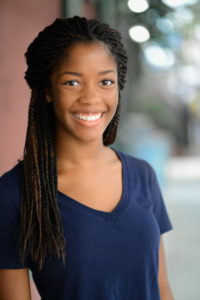
After graduating from NYU Tisch School in 2019, Johnson found work with the Williamstown Theatre Festival as a literary assistant. There she ran the summer literary department, produced new play readings, engaged in dramaturgy, and oversaw the administration of the L. Arnold Weissberger New Play Award.
Later this month, she will join Manhattan Theatre Club as an artistic production associate, a role that was newly created in an effort to bridge gaps among the artistic, literary, and casting offices. Previously, while still a student, Johnson interned for MTC, and her ties there helped to connect her with the new position, which she is grateful for, given the toll of the pandemic.
Johnson wants to devote her career in theatre administration to “building platforms for underrepresented artists.” She realizes that may mean having or creating more jobs that don’t exist yet.
“If, five years down the line, I’m in a completely different role that no one has ever heard of, but I still get to work in support of artists, students, and administrators while driving this industry towards being a more equitable and inclusive field—then screw the title,” she says.
Being part of the RLC has helped further clarify her mission, she adds. “The conversations that we’re having, they constantly inspire me to think differently and do more,” Johnson says. “I hope that we can eventually meet in person, but I’m already so overfilled with gratitude for the space that I’m able to hold with my fellow cohort members.”
Peter Kim: Having More Say
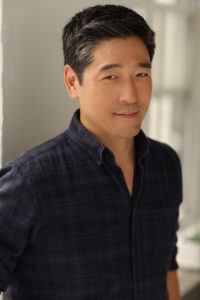
Actor, producer, and director Peter Kim may not presently be onstage, but he will be on Netflix this fall in the film The 40-Year-Old Version, which tells the story of a struggling playwright who decides she wants to become a rapper at age 40. Kim plays her best friend and agent.
“To date it is the most personal role I have played in my career,” says Kim, who infused his role with much of his own story, “and by chance also the largest role I have ever played in a movie.” The film netted its writer/director, Radha Blank, a best director award at Sundance, and Netflix hopes to do an awards push for it. It is an opportunity that just a few years ago Kim might have missed.
“When I was starting out as an actor, there was a stigma attached to pursuing other professions,” Kim says. So Kim stuck to acting, appearing on Broadway in Thoroughly Modern Millie, Off-Broadway in countless shows, and in TV and film (including in the film Hackers with Angelina Jolie).
But Kim, who calls himself “DL bossy,” wanted more say in the artistic process. He has a long relationship with NAATCO, a theatre company that showcases Asian American talent. And with them, he began producing. Now an associate producer, he has worked on several shows including Awake and Sing! By Clifford Odets, which received an Obie and a Drama League nomination. He started directing when a friend called and asked if he would be willing to direct a production at Princeton. The show went so well that he was offered a lecturer position. And he met Radha Blank when was hired to do dialect work for her—another job he hadn’t done previously.
Now, during the shutdown, Kim’s multiple interests are keeping him busy. He’s on the steering committee for AAPAC, the Asian American Performers Action Coalition, a grassroots organization that was recently honored with an Obie Award for Equity, Diversity and Inclusion. AAPAC is finalizing a report about the racial makeup of Broadway and Off-Broadway shows in the 2017-18 and 2018-19 seasons. He’s also working on a video project with friends who created the critically acclaimed Off-Broadway comedy, SIDES: The Fear Is Real. And he’s developing Deepa Purohit’s play The In Between with NAATCO.
“With my students and my mentees, so much of what I recommend is finding your tribe,” Kim says. “It takes a long time to find those people who are your creative brothers and sisters, but those relationships flourish over the years.” They lead to new opportunities, which is what Kim hopes will happen among the RLC.
“I feel like the fact that they put us together is the biggest gift thus far from the experience,” he says. “I know these people and that I can lean on them as we continue our path forward.”
A’shanti Tyree: Day by Day Into the Future

A’shanti Tyree had never thought about development work when she was studying theatre and producing at NYU’s Tisch School of the Arts. But right out of college, she found herself working for the Manhattan Theatre Club, first as a patron liaison, then as an individual giving officer, which involved taking ticket orders, encouraging renewals, and ensuring that patrons had great experiences.
“I was surprised to find how much I enjoyed connecting with other people about theatre and getting them to support the plays and programs that I love,” she says.
Tyree is now the individual giving manager at MTC, working directly with supporters to cultivate stewardship and strengthen the existing donor base. She also manages the Young Patron program. She has found that development is as important as ever during the shutdown, though she has changed the way she reaches out.
“Figuring out how to pivot to digital engagement with our donors while also being sensitive to the effects of this unprecedented time has had on everyone has been a challenge,” she says.
As Tyree steps into more prominent roles, she has been wondering what kind of leader she wants to be in the performing arts field, which is why she applied to be in the RLC.
“It’s great to be supported by a group of my peers who I may very well be working with in the future,” she says. Right now, of course, that future is a little bit less clear than it was in January. But Tyree is confident she’s headed in the right direction.
“I take things day by day at the moment,” she says. “There’s a lot going on in the world right now but the one thing I know for sure is I want to be part of the change happening in the arts community.”
Victor Vazquez: Casting With Imagination

In March 2020, Victor Vazquez, a casting director and founder of X Casting, had enough projects going that he needed to hire two assistants. Then, just a few weeks later, it all came to a screeching halt.
“Every single project we were working on went on pause,” he says. It was a difficult moment for Vazquez, who has worked for the last several years to deliberately reimagine what casting could look like.
Growing up in Compton, in South Los Angeles, Vazquez’s parents, both immigrants from Mexico, were not plugged into the local culture industry. But at 17, Vazquez saw his first theatrical production, The Lion King. “I was so captivated I went home, and I think Google had just been invented, so I searched, ‘Who is Julie Taymor and how did she get this career?’”
Inspired, Vazquez double majored in theatre and English at UC Irvine, where he studied directing and went on to work in several West Coast theatres. In 2017, Vazquez became the resident casting director for Arena Stage in Washington, D.C.
“I really wanted to investigate why casting directors have created this culture that seems to inflict a lot of trauma on artists,” Vazquez says. What did he discover? “There is this capitalist engine attached to [casting] that really starts seeing an artist or an actor as this expendable mechanism that sometimes becomes helpful because it can make some sort of profit,” he says.
So Vazquez worked to imagine something new. “For me, it became about how to create a casting process that at its root holds joy, at its root holds care, at its root holds access, at its root holds the long-term investment of a reciprocal professional relationship,” Vazquez says.
He brought that same methodology to hiring his assistants, both BIPOC, and building X Casting only to see the pandemic stop everything. Now, months later, Vazquez is starting to hear about the future of some of the projects he was working on.
“I’d say it is an exciting time because a lot of folks are reevaluating their process and slowing down,” Vazquez says. Sometimes, he would get requests to cast a reading that was happening in a week or a show that started rehearsals in two months. “Casting requires time; it requires patience; it requires the care of a designer.”
Now Vazquez’s clients “have the time and space to dream and imagine in a really ample way,” he says. “I really do believe that casting is about the power of the imagination.”


